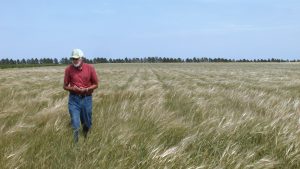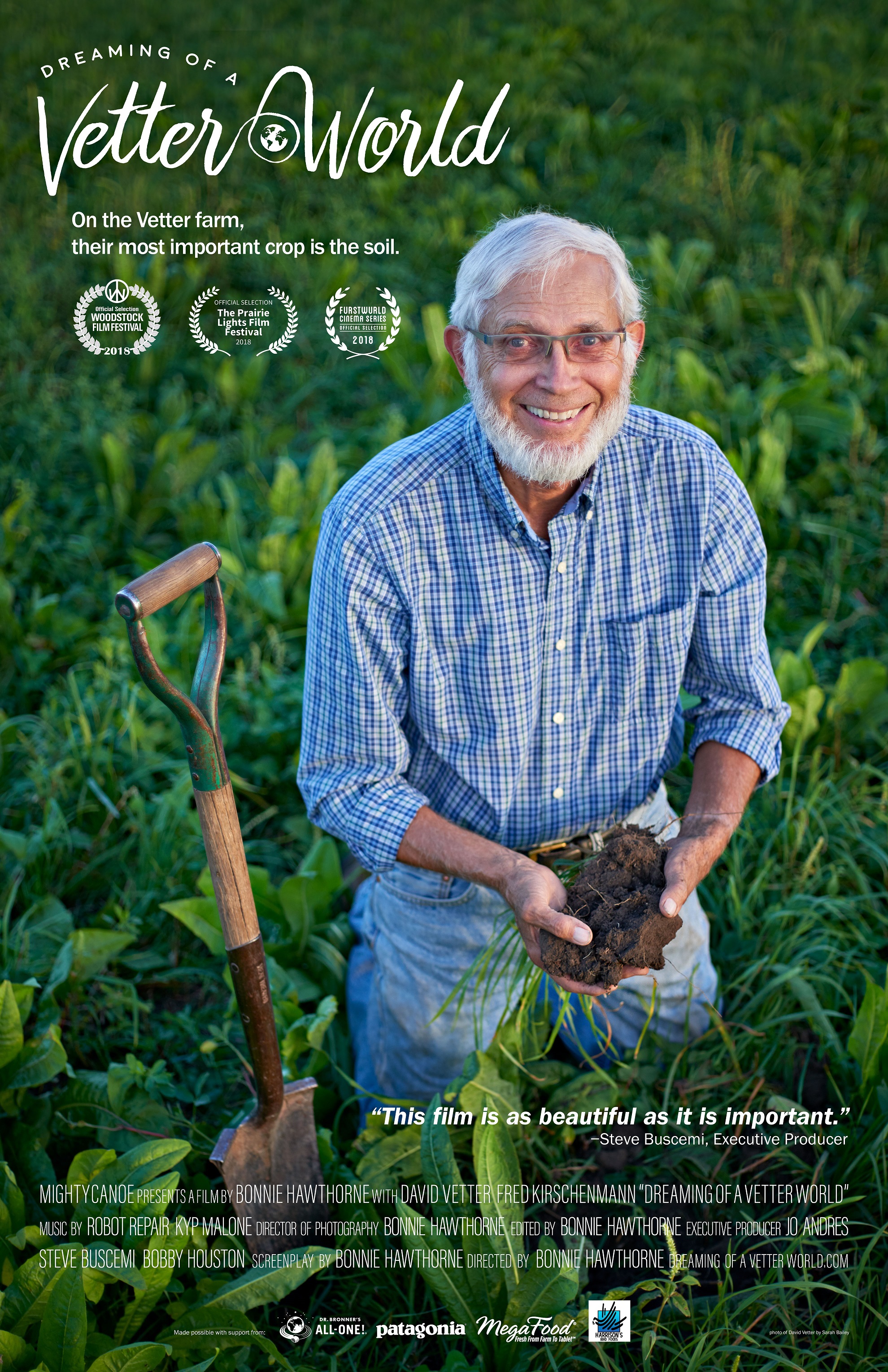If there is one person who embodies how far organic farming and food have come, it is David Vetter. An organic farmer in Marquette, Nebraska for more than 40 years, Vetter grew organic when few people were. He started with a spiritual commitment to being a good steward of the land, to making his soil healthy and fertile, and to growing organic crops and livestock without agricultural chemicals. He succeeded. His business, Grain Place Foods, is a thriving organic grain processor.
David Vetter’s journey as an organic farmer is told in an inspiring new documentary by filmmaker Bonnie Hawthorne, Dreaming of a Vetter World, whose executive producer is noted film actor Steve Buscemi.
The film chronicles the history of the Vetters’ farm, starting with David’s father Don, who, concerned about the toxicity of agricultural chemicals, stopped using them in the early 1950s. “In 1953, I made up my mind that I wasn’t going to do this anymore,” Don says in the film.
His son, David, returned to the farm in 1975 to help his father after studying at a theological seminary. David had earlier earned an undergraduate degree in soil science and agronomy.
While at the seminary, one of his teachers was Fred Kirschenmann, who was inspired by a paper Vetter had written about being a “minister to the soil.”
“I went back to the farm in North Dakota and converted it to organic. The student taught the teacher,” says Kirschenmann, one of the most respected leaders in organic and sustainable farming in the U.S.
The film describes the struggles Vetter faced as the only organic farmer in his area.
“Other kids would tease us, and say ‘Why are your fields full of weeds? Why does your crop look so funny?” recalls Vetter’s daughter Darci, who served as Chief Agricultural Negotiator for the U.S. Trade Representative in the Obama administration.
“My dad and grandfather were topics of conversations in the Marquette coffee shop,” says another daughter, Allison, an associate professor of sociology at Henderson State University in Arkansas.
But Vetter outlasted other farmers who ridiculed him, and today his Grain Place Foods employs 30 people from the local community
The film, which moves at a relaxed Midwestern pace with panoramic views of the Nebraska farm landscape, big skies, and thunderstorms, showcases David’s organic methods. He uses a 9-year crop rotation that includes “green manure” crops such as alfalfa, clover, and turnips to build soil fertility. The farm has cattle and hogs, which Vetter refers to as “composters on legs,” and bees. The film shows how Vetter’s farm is bursting with life and biodiversity, in contrast to the massive, industrial corn and soybean fields that surround his farm. Vetter has practiced regenerative agriculture long before the term became a buzzword.
He has the wisdom to see beyond this year’s crop. “I look at things long-term and I’m willing to settle for less in the short term for greater long-term success.”

David Vetter walks in his field of organic barley. Photo by Bonnie Hawthorne
Vetter has been honored many times, including an Organic Leadership Award from the Organic Trade Association, Organic Farmer of the Year from the Midwest Organic and Sustainable Education Services, and Organic Pioneer Award from the Rodale Institute. But his humility is clearly evident in the film.
“The farm is like an organism where each part supports and enhances the other part,” he says.
When asked why more farmers don’t transition to organic, he says. “Everyone doesn’t do it because it’s more work and takes more thought.”
The film describes the significant threats to Vetter’s farm from pesticide drift and contamination by genetically modified crops, grown on the large industrial corn and soybean farms that surround his.
“We’ve had to deal with cross contamination of genetically engineered corn since the late 1990s,” he says. “This is a technology introduced into agriculture for which we get none of the benefits, and we have to bear a significant part of the cost. A PCR test (to detect contamination from GM crops) costs $600 to $900.”
In a touching part of the film, Vetter credits his wife Jean, who worked as a medical technologist and helped the farm survive in the challenging early years. Today, Jean has Alzheimer’s disease, and David is her caretaker.
“In early years Jean took care of us, and now it’s my turn to take care of her,” Vetter says.
Dreaming of a Vetter World is a primer on regenerative agriculture for any farmer and the value of organic farming for everyone else. Mostly, it is an inspiring story of how one humble man succeeded against all odds, and made a positive difference in the world.





